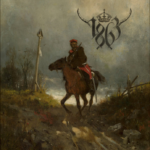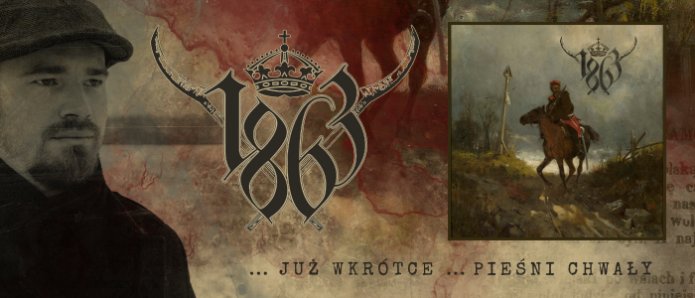 Malchus guitarist/vocalist Radoslaw Solek has pulled together a melodic death metal project commemorating the 1863 January Uprising that is a vital part of Polish history and had broad implications for Europe in general.
Malchus guitarist/vocalist Radoslaw Solek has pulled together a melodic death metal project commemorating the 1863 January Uprising that is a vital part of Polish history and had broad implications for Europe in general.
The easiest way to talk about the 1863 project is to start with Radoslaw Solek’s band Malchus, which has long been one of my favorites even with most releases being in Polish. Their combination of traditional instruments, folk influences, and melodic death metal works really well. One of my favorite parts of the Malchus story is that they trace their roots to a punk rock demo, a long way from the folk-influenced melodic death metal where the band has come into their own. Guitarist/vocalist Radoslaw Solek started the band in Dębica, Poland and the band has seen quite a metamorphosis in their sound since the punk rock days, evolving from folk metal to melodic death metal sound from Didymos (2010) to the more folk-influenced Caput Mundi (2011), to the more polished Dom Zly (2014), which was further refined in Ur (2017), to Dziedzictwo (2019) and now Apokalipsa in 2021. While often a challenge to easily understand the topics of the bands songs, there are some English versions of a couple albums and their videos often have English subtitiles for those who are curious. On Dziedzictwo, the band had a song and video for a track that translates to “Heritage of War” and was a tribute to those who fought to defend the Polish fatherland fighting for independence, so Radoslaw is no stranger to brining in Polish history to his music. 1863 is a project that deals with the January Uprising, the longest-lasting insurgency in the Polish fight for independence that ended in 1864 and saw many insurgents sent to Siberia.
Those wondering what to expect from 1863 and know Malchus will be in familiar territory from the opening heavy riffing, near blast beats and Radoslaw Solek’s rough gravelly screamed vocals. Behind it all is solid rhythm section that lends additional heaviness and an almost groove at times. The tonality of the guitar riff and blast beat drums almost have the song “Żegnam Czule” venturing into black metal territory which is a bit surprising. Production quality is outstanding with vocals and all instruments coming through cleanly in the mix. You can feel the emotion in the heavier parts and the quieter sections make strong use of silence like when the female vocals come in during part of “Błogosławieństwo”. Much like found in Malchus songs, Radoslaw brings in quieter moments often with traditional instruments to great effect.
In contrast to “Żegnam Czule”, “Branka” starts out with some quiet, clean guitar, and a calmness that eventually turns heavy when the guitars become distorted. From there the song takes a number of twist and turns, changing tempo and ferocity before ending with the guitars and relative calm of the opening.
Traditional or at least non-metal instruments come to the forefront in the beginning of “Wędrowcy” (Wanderers). Fittingly, the track almost feels like a marching song in the opening before taking a heavier turn. Throughout the track, the quality of the production and mixing really come through with the variety of instruments making strong contributions to the overall sound. There is some great bass lines in the track and so many different instruments take the lead at times it sounds much like an all-star project where multiple different artists all had different parts.
“Interludium” really stands out as it’s a fun jazzy, piano driven piece that provides a break from the ongoing heaviness elsewhere on the album. Immediately after this, the melodic death metal comes back full force with “W walce”, a complex song that seems to go in unexpected directions from time to time with clean guitars taking over the lead part of the song and again the use of a lone instrument and silence is put to good use.
“Manifest” is one of my favorite tracks on the album and also one of the more complex arrangements, shifting between the quiet and loud, heavy and soft seamlessly and even bringing in a wide variety of styles from groove to black metal riffs to piano floating effortlessly among it all before the surprise ending.
“Iskra” opens up with a bit of a melodic groove but as one might imagine there are a number of twists and turns as the song moves along as folk elements and instruments take the forefront before more of the groove-heavy riffs driven along by some great bass lines and strong drumming.
Radoslaw Solek has created a lush sonic landscape within the songs of 1863, bringing in traditional instruments and folk elements with melodic death metal, using the heaviness and quiet silence to great effect in telling the story of insurgency and conflict during the January Uprising.
Rating: 9/10
Written by John Jackson
Tracklist
1. Żegnam Czule (Goodbye Tenderly)
2. Branka
3. Błogosławieństwo (Blessing)
4. Wędrowcy (Wanderers)
5. Interludium (Interlude)
6. W walce (In Combat)
7. Manifest (Manifesto)
8. Emigrant
9. Cytadela (Citadel)
10. Iskra (Spark)
11. Na Sybir (To Siberia)
12. Non Omnis Moriar (Not Everyone Dies)
Band Members
Radosław Sołek – Guitar, vocals, instruments
Release Date: Sept. 2023
Record Label: Independent
Social Media: Facebook / Bandcamp
Video for “Non Omnis Moriar”
Video for “Branka”
Video for “W walce”
Video for “Iskra”
